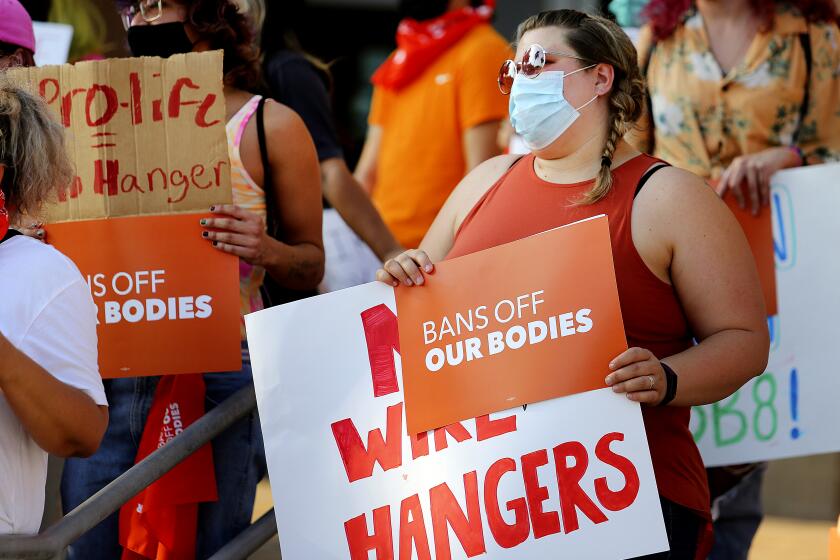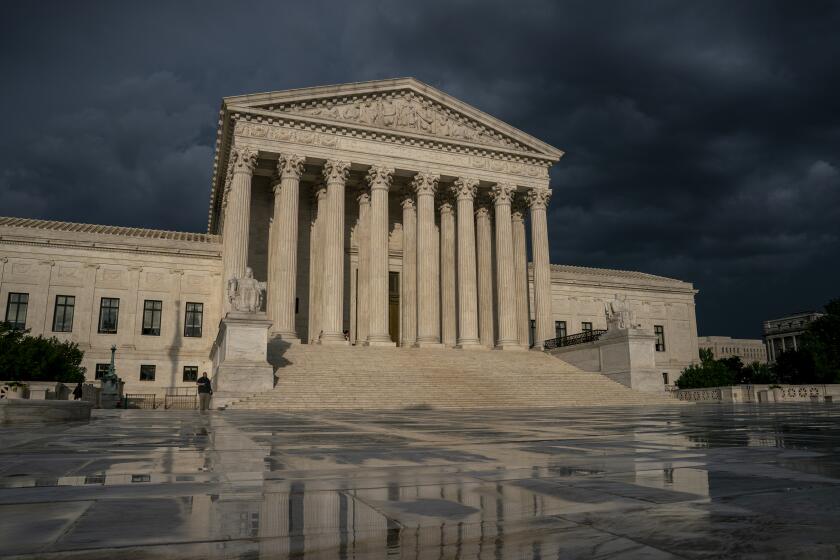Column: Can the Jan. 6 committee corral prime witness Mark Meadows? Itâs tricky

Now that Stephen K. Bannon has surrendered, snarling and vengeful, to face charges of criminal contempt of Congress, the attention of the Jan. 6 House Select Committee turns to President Trumpâs last chief of staff, Mark Meadows, who followed in Bannonâs footsteps last week in refusing even to show up for a scheduled deposition or turn over subpoenaed documents.
Judging from the current war of words, Meadows and the committee are at loggerheads and another criminal contempt referral is in the works.
Committee member Rep. Adam B. Schiff (D-Burbank) said on âMeet the Pressâ on Sunday that Meadowsâ recalcitrance âpretty much forces our hand.... Iâm confident weâll move very quickly against Mr. Meadows.â
Meadowsâ counsel, former Deputy Atty. Gen. George Terwilliger, wrote in the Washington Post last weekend that âthe only path to resolution may run through the courts.â
On Tuesday, the committee chairman, Rep. Bennie Thompson (D-Miss.) announced heâd sent a letter to Meadows: âWe need these questions answered.â
As it turns out, the Department of Justice has emphatically resisted contempt of Congress referrals related to the executive branch.
But Meadowsâ case is very different from Bannonâs. Both he and the committee have a lot to lose from a criminal referral, which suggests that they may yet work out a resolution.
For the committee, a substantial downside to criminal contempt charges is that theyâd lose access to Meadows and his information. His alleged crime is what would be decided in federal court, and until the case was resolved, which almost surely would be after the effective life of the Jan. 6 committee, no one in Congress would be grilling him.
That was a cost the committee was willing to pay with the garrulous, ever-combative Bannon. He has made plenty of public statements the committee can make use of â remember his Jan. 5 podcast classic, âAll hell is going to break loose tomorrowâ?
The Supreme Courtâs decision in the SB 8 case could restore abortion rights in Texas. But thatâs not why it will be one for the books.
Not so Meadows, who has tried to stay out of the public eye since the rampage. As Trumpâs primary minder at the end, he is perhaps the most knowledgeable source about the former presidentâs movements, statements, communications and emotions on Jan. 6. And news reports suggest Meadows himself may have been deeply involved in attempts to find Trump votes in Georgia and in planning the rally that sparked the Capitol conflagration. The House committee doesnât want his evidence to be lost to a criminal process.
Moreover, the committee canât predict what the outcome of a criminal referral would be. It doesnât know the particulars that fed into the departmentâs decision to indict Bannon. Meadowsâ communications with Trump, unlike Bannonâs, could be considered strong candidates for protection under executive privilege. If the committee refers Meadows to the Justice Department, itâs possible the Justice Department would evaluate Meadowsâ criminal intent differently from Bannonâs.
The Bannon indictment was a triumph for Congressâ powers of investigation (and the rule of law) after the Trump years, in which congressional subpoenas were casually and successfully flouted. If a Meadows referral were to come out the other way, it could once again brand Congress a paper tiger.
If the committee has reasons to avoid a criminal referral, so does Meadows. His demeanor is light-years from the bring-it-on pugilism of Bannon. He has nothing to gain from outlaw status. Nor is he known to have the deep pockets needed to fund a federal court criminal defense. And, after his White House stint, he surely hoped for a future in important D.C. professional circles. A criminal conviction for contempt of Congress would cripple if not demolish those prospects.
The bullet the United States dodged in 2020 wasnât a boots-in-the-streets coup but jurisprudence at the Supreme Court.
Itâs conceivable the committee is considering bringing a civil contempt case against Meadows. If it could be done quickly, and if it succeeded, that would be a powerful option: Meadows would go to jail and stay there until he complied with the committeeâs subpoena.
Unfortunately, until recently, Team Trump has been able to string along civil cases aimed at investigating the former president for a year or more, effectively taking the civil option off the table. Itâs true that the federal courts have been moving at lightning speed (comparatively) to consider (and very likely reject) Trumpâs own case to resist the committeeâs document request. Still, Thompson and Co. canât be sure of a speedy civil contempt action; the committee could find itself stuck in a familiar morass of delay and stonewalling.
Itâs galling to contemplate that Meadows might evade the full measure of his legal responsibility to comply with a congressional demand that is of surpassing importance. But Meadows and the committee are locked in a game of chicken, in which each has significant risks of losing something very valuable â Meadows his liberty and livelihood, the committee critical testimony. Sometimes games of chicken end in spectacular crashes. Sometimes thereâs an outright winner. More frequently, the combatants veer away from an all-or-nothing outcome. Look for something like that to happen here.
More to Read
A cure for the common opinion
Get thought-provoking perspectives with our weekly newsletter.
You may occasionally receive promotional content from the Los Angeles Times.














